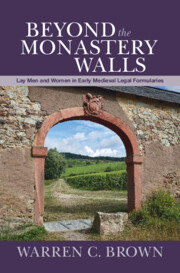Book contents
- Beyond the Monastery Walls
- Beyond the Monastery Walls
- Copyright page
- Dedication
- Contents
- Figures
- Acknowledgments
- Abbreviations
- Part I The Gate
- Part II The Laity
- 4 Laypeople and Documents
- 5 Laypeople and Property
- 6 Family
- 7 Conflict and Justice
- 8 Power, Personal Relationships, and Letters
- 9 Freedom and Unfreedom
- 10 Conclusions
- Bibliography
- Manuscript Index
- Main Index
8 - Power, Personal Relationships, and Letters
from Part II - The Laity
Published online by Cambridge University Press: 09 December 2022
- Beyond the Monastery Walls
- Beyond the Monastery Walls
- Copyright page
- Dedication
- Contents
- Figures
- Acknowledgments
- Abbreviations
- Part I The Gate
- Part II The Laity
- 4 Laypeople and Documents
- 5 Laypeople and Property
- 6 Family
- 7 Conflict and Justice
- 8 Power, Personal Relationships, and Letters
- 9 Freedom and Unfreedom
- 10 Conclusions
- Bibliography
- Manuscript Index
- Main Index
Summary
This chapter illuminates a key characteristic of lay society in the Carolingian period: it was built on personal relationships, such as those between lords and their followers, vassals, or unfree, between patrons and clients, between friends – in short, between those who could offer help and those who needed it. The importance of these relationships is revealed above all in formulas for letters, in which clients asked patrons for help or asked them to intercede with other powerful people to help them solve problems, or in which people with power wrote to an equal or superior on behalf of a supplicant. These letters reach very far down the social scale. Some deal with unfree who have gotten into difficulties and have asked a patron for help. Quite a few tell of unfree who have gotten in trouble with their own lord and run to another powerful person – such as the Carolingian courtier and lay abbot Einhard – to beg his intercession. They show us a society in which power appears to have flowed through these personal relationships as or perhaps more strongly than it did through lines that we might describe as connecting governing and governed, or ruling and ruled.
- Type
- Chapter
- Information
- Beyond the Monastery WallsLay Men and Women in Early Medieval Legal Formularies, pp. 252 - 283Publisher: Cambridge University PressPrint publication year: 2022

